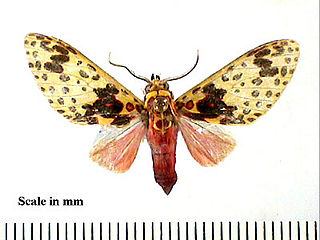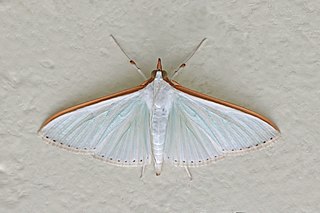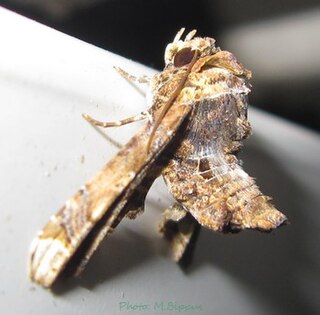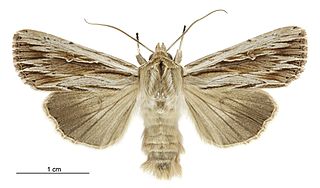| Persectania | |
|---|---|
 | |
| Persectania ewingii | |
| Scientific classification | |
| Kingdom: | |
| Phylum: | |
| Class: | |
| Order: | |
| Family: | |
| Genus: | Persectania Hampson, 1905 |
Persectania is a genus of moths of the family Noctuidae. [1]
| Persectania | |
|---|---|
 | |
| Persectania ewingii | |
| Scientific classification | |
| Kingdom: | |
| Phylum: | |
| Class: | |
| Order: | |
| Family: | |
| Genus: | Persectania Hampson, 1905 |
Persectania is a genus of moths of the family Noctuidae. [1]
Species in this genus are as follows: [2] [3]

Amata is a genus of tiger moths in the family Erebidae. The genus was erected by Johan Christian Fabricius in 1807.

Amaxia is a genus of moths in the family Erebidae erected by Francis Walker in 1855. The type species of the genus is Amaxia pardalisWalker, 1855.

Eucereon is a genus of tiger moths in the family Erebidae. The genus was erected by Jacob Hübner in 1819.
Neoscaptia is a genus of moths in the family Erebidae. The genus was erected by George Hampson in 1900.
Prepiella is a genus of moths in the subfamily Arctiinae. The genus was described by Schaus in 1899.
Zatrephes is a genus of moths in the family Erebidae. The genus was erected by Jacob Hübner in 1819. It was formerly considered part of the Arctiidae. It includes the former genus Ennomomima, which is now considered a synonym.

Saurita is a genus of moths in the subfamily Arctiinae. The genus was erected by Gottlieb August Wilhelm Herrich-Schäffer in 1855.

Teracotona is a genus of moths in the family Erebidae from the Afrotropics. The genus was erected by Arthur Gardiner Butler in 1878.

Trichromia is a genus of moths in the family Erebidae erected by Jacob Hübner in 1819. The members of this genus are largely indigenous to South America.

Anania is a genus of moths of the family Crambidae described by Jacob Hübner in 1823.

Diaphania is a genus of moths of the family Crambidae.

Udea is a genus of snout moths in the subfamily Spilomelinae of the family Crambidae. The genus was erected by Achille Guenée in 1845. The currently known 215 species are present on all continents except Antarctica. About 41 species are native to Hawaii.
Prionapteryx is a genus of moths of the family Crambidae.

Ichneutica is a genus of cutworm or dart moths in the family Noctuidae. The genus is found in New Zealand and surrounding islands. There are more than 80 described species in Ichneutica, the largest known genus of Lepidoptera in New Zealand. In 2019 this genus was revised and greatly expanded with the genera Graphania Hampson, 1905, Tmetolophota Hampson, 1905 and Dipaustica Meyrick, 1912 all subsumed within it.

Eutelia is a genus of moths of the family Euteliidae erected by Jacob Hübner in 1823.

Meterana is a genus of moths of the family Noctuidae. This genus is endemic to New Zealand.

Abraxas, the magpie moths, is a genus of moths in the family Geometridae. It was first described by William Elford Leach in 1815.

Desmia is a genus of moths of the family Crambidae. The genus was erected by John O. Westwood in 1832.

Persectania aversa, commonly known as the southern armyworm, is a moth of the family Noctuidae. It was first described in 1856 by Francis Walker. It is endemic to New Zealand and can be found throughout the country including the North, South, Stewart and Chatham Islands. This species inhabits open grasslands. Larvae feed on grass species including commercial crops such as oats and barley and as a result this species is regarded as an agricultural pest. Adults are nocturnal and are attracted to light. They are on the wing throughout the year.

Ichneutica chryserythra is a moth of the family Noctuidae. Living specimens have distinctive violet red coloured forewings but can be distinguished from the similar species Ichneutica marmorata as it lacks the dark edge markings of the later species. I. chryserythra can only be found in the southern parts of the South Island. Adults are on the wing between November to January. The life history of the species and the host species of its larvae are unknown.